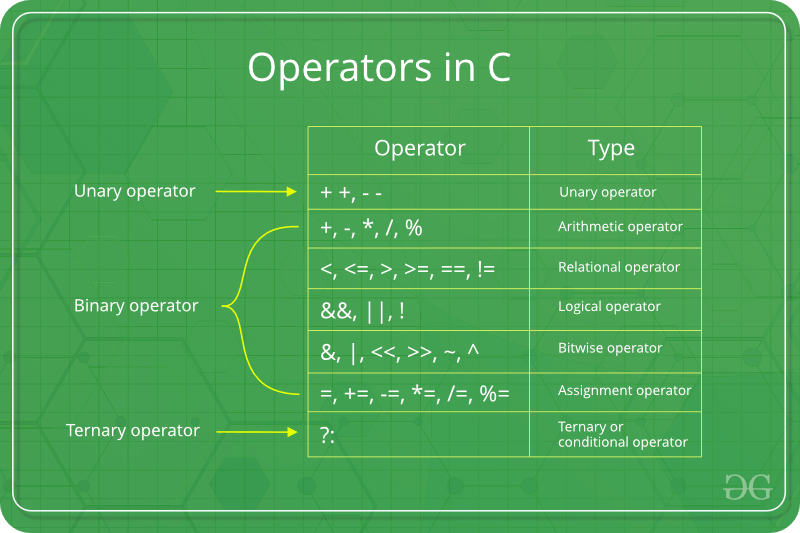Explain Different Operators in C Language
Operators Associativity is used when two operators of same precedence appear in an expression. Here is a tabular form of the number of arithmetic operators in C with the functions they perform.

Programming In C Operators Practice Arithmetic Relational And Logical Arithmetic Logic Practice
The three main logical operators are and.

. Arithmetic is most popular usage of operators. The output 1 and 0 denotes the True and False respectively. Few operators like increment operator are the unary operator which means they operate on one operand only.
An operator is a special symbol that tells the compiler to perform specific mathematical or logical operations. C Programming Language supports different types of Operators. Associativity can be either L eft t o R ight or R ight t o L eft.
Arithmatic Operators is used to perform MathematicalArithmatic Operations. C 2 same as C C. Unary operators act on single Operand.
Int a b c. There are following three types of operators in C language. These two operators are unary operators meaning they only operate on a single operand.
There is also a ternary operator in C called Conditional Operator which takes three operands. Different operator takes different number of operands to perform its task. Through these the conditional operations that are being performed can be very well understood.
This type of operator works with a single value operand like and. Supported by the C Language. Besides the operators discussed above there are a few other important operators including sizeof and.
8 Binary Right Shift. Different Logical Operators in C. Depending upon the number of operands The Operators are Classified into 3 types.
These operators are used to either increase or decrease the value of the variable by one. C 5 same as C C 5 Bitwise AND assignment operator. It takes modulus using two operands and assigns the result to the left operand.
Lets have a look on all operators one by one. As usual as subtraction we know. These operators require two operands to perform an operation.
C A. C provides four classes of operators. And have same precedence and their associativity is L eft t o R ight so the expression 100 10 10 is treated as 100 10 10.
An operand is a data item on which operators perform the operations. Operators are symbolls used to perform logical and Mathematical Operations. Here 4 and 5 are called operands and is called operator.
Using various operators in C one link the variables and constants. Arithmetic Operators Relational Operators Shift Operators Logical Operators Bitwise Operators Ternary or Conditional Operators Assignment Operator Misc Operatoretc. Operators in programming languages are taken from mathematics.
This type of operator works with two operands like -. C Right shift AND assignment operator. Operators C language uses some.
7 rows Apart from arithmetic relational logical assignment etc. In the following example two numbers are added and assigned to a variable. C programming has two operators increment and decrement -- to change the value of an operand constant or variable by 1.
C language is rich in built-in operators and provides the following types of operators. Sizeof and ternary operators. There are 6 Operators in C language.
These are used to assign the values for the variables in C programs. C is rich in the use of different operators. The truth tables can be understood by.
C language supports following type of operators. Logical or Relational Operators. There are following arithmetic operators supported by C language.
It includes basic arithmetic operations like addition subtraction. C language supports a rich set of built-in operators. C Operators with programming examples for beginners and professionals.
The result of XOR is 1 if the two bits are different. Conditional operators return one value if condition is true and returns another value is condition is false. C 5 same as C C 5 Bitwise exclusive OR and assignment operator.
They are 1 Arithmetic 2 Relational 3 Logical 4 Bitwise. In C most of the operators are binary operators ie. An operator is a symbol that tells the compiler to perform specific mathematical or logical functions.
Add Subtract Multiply Divide Modulus Increment Decrement operations can be done with arithmetic operators. These are used to perform mathematical calculations like addition subtraction multiplication division and modulus. We will learn about this in detail in the.
The left operands value is moved right by the number of bits specified by the right operand. Add operator is as expected. There are following types of operators to perform different types of operations in C language.
Increment increases the value by 1 whereas decrement -- decreases the value by 1. C A Modulus AND assignment operator.

Operators In C C Geeksforgeeks

Operator Symbols Equal To Not Equal To Greater Than Greater Than Or Equal Less Than Less Than C Programming Programming Languages Language

Programming In Java Operators Arithmetic Relational And Logical Ope Arithmetic Logic Java
Comments
Post a Comment